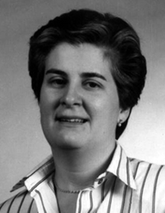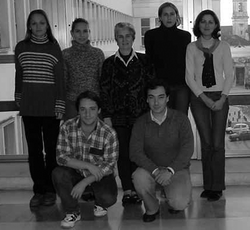DOI: 10.1039/B211390M
(Profile)
Analyst, 2003, 128, 12-12
In Profile: Ana Maria Oliveira Brett, University of Coimbra
Ana Maria Oliveira Brett obtained her BSc degree in Chemistry from the University of Coimbra (Portugal) in 1973 and her PhD with John Albery in Electrochemistry from Imperial College of Science and Technology, London University, UK, in 1980. She continued as a NRDC Postdoctoral Fellow for a year working on aspects of photoelectrochemistry. In 1981 she was appointed to a Lectureship in Chemistry at Coimbra University. She was awarded the DSc degree from the University of Coimbra in 2002. Ana Maria’s research is centered on fundamental aspects in the areas of bioelectrochemistry, the study of electron transfer reactions of compounds of biological interest, and bioelectroanalysis, the development of enzymes and DNA biosensors. Current efforts include studies of the morphology of DNA adsorbed at solid charged interfaces, electrochemical detection of the mechanisms of DNA–drug interactions and evaluation of oxidative damage caused to DNA by health hazardous compounds. Related research is concerned with the study of electron transfer reactions of antioxidants and understanding the free-radical-induced damaging aspects of the chemistry of disease processes. She is a member of several Scientific Societies and has been an active member collaborating during different periods as Division Officer of Analytical Electrochemistry and Bioelectrochemistry, for the International Society of Electrochemistry (ISE), and since 1994 is a Member of the Council of the International Bioelectrochemical Society (BES). Research activity is documented by more than 90 papers published, co-author of 2 undergraduate/graduate textbooks Electrochemistry. Principles, Methods and Applications, 1993 and Electroanalysis, 1998, both Oxford University Press, 6 chapters in multi-author books, attending and presenting research work at research conferences, and has been invited to present more than 40 lectures since the 1980s. She has served on the Editorial Advisory Board of Bioelectrochemistry and Bioenergetics, and is presently one of the Associate Editors of Bioelectrochemistry. |
Do you remember your first experiment?
No, but I remember very well my first lecture on Atomic Theory. I was fascinated to hear about atoms, orbitals, etc.Who inspired you to follow your chosen career?
I was always very interested reading the bibliographies of scientists, such as Lavoisier, Faraday, Pierre and Marie Curie, etc., and following the progress of their discoveries in those days, with so little resources.Where will analytical science take us next century?
I think that analytical science in the next century will be focused on the development of the emerging areas of applications to natural samples in the biological and environmental fields. These areas will be asking analytical science for new methodologies, for detection of the immense number of analytes in natural samples not yet identified, and novel in vivo and nano-analytical-technology will be established.What was the most exciting talk you heard recently?
Sometimes the most exciting talks are about novel science, other times from the approach taken by the presenter, so I will not mention specific names. However, I find there are always some very interesting talks given at conferences, especially when the subject is in vivo electroanalytical research.What advice would you give to a young scientist wanting to pursue an academic career in analytical science?
My advice to a young student wanting to pursue an academic career in analytical science would be to have a good background in all branches of chemistry, to look at the needs for new analytical methodologies and to be creative.What′s your ultimate research goal?
To contribute to clarifying some electron transfer reactions occurring in biological systems.What website(s) have you found really useful in your work?
Web of Science—http://www.isinet.com/isi/ and PubMed Central—http://www.pubmedcentral.nih.gov/Your recommended general textbook?
For general text books to start studying electrochemistry I would recommend Electrochemistry. Principles, Methods and Applications, 1993 and Electroanalysis, 1998, both Oxford University Press, which in fact were written for that purpose.| Prof. Brett’s research group at Coimbra |
| This journal is © The Royal Society of Chemistry 2003 |


